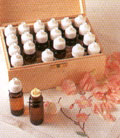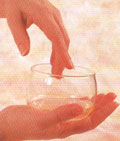|
|
Aromatherapy for ALZHEIMER DISEASE
Aromatherapy is the use of essential oils (either extracts or essences) from
flowers, herbs, and trees to treat mental
and physical disorders.
 Aromatherapy
can ease the sleeplessness and agitation common among patients with
Alzheimer�s disease and other forms of dementia,
according to British researchers. In a four-week study of how aromatherapy can
affect elderly dementia patients, roughly one-third suffered fewer bouts of
agitation when they were rubbed with a lemon balm compared to one in 10 who
showed improvement when rubbed with an odorless sunflower oil. Aromatherapy
can ease the sleeplessness and agitation common among patients with
Alzheimer�s disease and other forms of dementia,
according to British researchers. In a four-week study of how aromatherapy can
affect elderly dementia patients, roughly one-third suffered fewer bouts of
agitation when they were rubbed with a lemon balm compared to one in 10 who
showed improvement when rubbed with an odorless sunflower oil.
�Patients exposed to lemon balm also showed significant improvements in the
quality of life, including a decrease in social withdrawal and an increase in
constructive activities,� study leader Clive Ballard of the University of
Newcastle, Newcastle upon Tyne told the conference.
Similarly, Studies with brain wave frequency has shown that smelling lavender
increases alpha waves in the back of the head, which are associated with
relaxation. Fragrance of Jasmine increases
beta waves in the front of the head, which are associated with a more alert
state.
◊ How does it work
 Each
essential oil contains as much as 100 chemical components, which together exert
a strong effect on the whole person. Depending on which component is
predominating in an oil, the oils act differently. For example, some oils are
relaxing, some soothes you down, some relieves your pain, etc. Then there are
oils such as lemon and lavender, which adapt to what your body needs, and adapt
to that situation. (These are called "adaptogenic"). The mechanism in which
these essential oils act on us is not very well understood. What is understood
is that they affect our mind and emotions. They leave no harmful
residues. They enter into the body either by absorption or inhalation. Each
essential oil contains as much as 100 chemical components, which together exert
a strong effect on the whole person. Depending on which component is
predominating in an oil, the oils act differently. For example, some oils are
relaxing, some soothes you down, some relieves your pain, etc. Then there are
oils such as lemon and lavender, which adapt to what your body needs, and adapt
to that situation. (These are called "adaptogenic"). The mechanism in which
these essential oils act on us is not very well understood. What is understood
is that they affect our mind and emotions. They leave no harmful
residues. They enter into the body either by absorption or inhalation.
Essential oils stimulates the powerful sense of smell. It is known that odors we
smell have a significant impact on how we feel. In dealing with patients who
have lost the sense of smell, doctors have found that a life without fragrance
can lead to high incidence of psychiatric problems such as anxiety and
depression.
It is believed that smells enter through cilia (the fine hairs lining the nose)
to the limbic system, the part of the brain that controls our moods, emotions,
memory and learning.
Name of the chemical component
|
Properties of the chemical
component
|
Essential oils that contain the
chemical
|
Aldehydes
|
anti-inflammatory, calming, sedative and anti-viral.
|
Characteristic lemon-like smell, such as lemon grass, lemon
balm, citronella, eucalyptus
|
Alcohols
|
bactericidal (kills bacteria), stimulant, energizing,
vitalizing, antiviral, diuretic. Our pancreas produce 32 kinds of
alcohol for use in human metabolism.
|
Rose, petitgrain, rosewood, peppermint, myrtle, tea tree,
sandalwood, patchouli, and ginger
|
Phenols
|
strongly bactericidal, tonic, stimulates immune system,
invigorating, warming. Can produce slight liver toxicity if taken
high doses for extended periods of time. Used in lip balms and cough
drops.
|
Clove, cinnamon, thyme, oregano, savory, cumin.
|
Cetone (Ketones)
|
wound healing, mucolytic (eases the secretion of mucous),
stimulates new cell growth. used as a nail polish.
|
Camphor, rosemary, sage, eucalyptus globulus and hyssop
|
Terpenes
|
Very stimulating, potential skin irritants, anti-viral
properties.
|
Lemon, orange, bergamot, black pepper, pine oils, nut meg and
angelica.
|
Sesquiterpenes
|
anti-phlogistic (moves fluids), anti-inflammatory, sedative,
anti-viral, anti-carcinogenic, bacteriostatic and immune stimulant
|
Blue chamomiles, immortelle, tansy, yarrow and tagetes.
|
Esters
|
anti-fungal, sedative, calming, spasmolytic, fungicidal,
anti-inflammatory.
|
Roman chamomile, lavender, clary sage, petitgrain, bergamot.
|
Lactones (part of ester group)
|
anti-inflammatory, mucolitic
|
arnica, elecampane
|
Ethers
|
harmonizing to the nervous system. antiseptic, stimulant,
expectorant (increases secretions), spasmolytic, and diuretic.
|
Cinnamon, clove, anise, basil, tarragon, parsley, and sassafras.
|
-
 If you don't want to buy individual essential oils buy them
ready-blended, or treat yourself to bath and body products that contain
them. If you don't want to buy individual essential oils buy them
ready-blended, or treat yourself to bath and body products that contain
them.
-
Some oils are thought to carry some risk during
pregnancy. For this
reason, consult a qualified aromatherapist for advice if you are expecting a
child and want to use essential oils.
-
Don't try to treat medical conditions with them-always consult your GP.
-
Essential oils can be expensive, but remember that a little goes a long
way.
-
Don't apply essential oil to the skin undiluted as they are far too
concentrated in this form, and can result in inflammation. The only
exception is lavender, which can be used directly on the skin for insect
bites and stings. Otherwise essential oils should be mixed with a carrier
oil.
-
Don't take essential oils internally. Essential oil are approximately 50
to 100 times more powerful then the plant they were extracted from.
-
Don't apply oils to areas of broken, inflamed or recently scarred
skin.
-
 Whichever method of aromatherapy you use, shut the door to the room to
prevent the aroma from escaping! Whichever method of aromatherapy you use, shut the door to the room to
prevent the aroma from escaping!
-
For immediate result from aromatherapy, try inhaling the steam. Add
about 4 drops of your chosen oil to a bowl of hot water, lean over it and
cover your head with a towel. inhale deeply for about 5 minutes.
-
Place a few drop of your favourite oil on a tissue, so you can inhale it
whenever you like. Eucalyptus is great if your, sinuses are blocked and you
have a cold. Alternatively, sprinkle a few drops of chamomile or lavender on
your pillow to help you sleep.
Related Links
|
|
|
|
|









